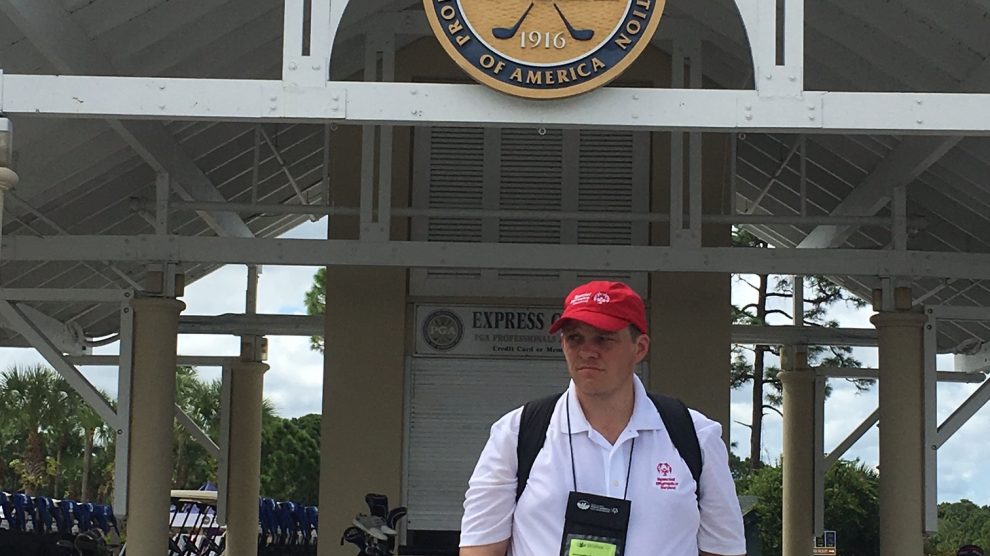Alex Richardson loves to play golf. And, just like anyone else, there's room for him to improve. He struggles with distance control, and he has a hard time with the short game.
As his father Joe says, "It can be hard for him to put good shots together in a row."
But, Alex, 35, continues to get better. And he loves competition. He loves the challenge since taking up the game at Joe's urging 10 years ago. After a decade in the game, Alex and Joe qualified for their first national competition, earning a spot in the Special Olympics national golf tournament, which was played the week of the Ryder Cup at PGA Golf Club in Port St. Lucie, Fla.
Some 200 athletes from around the United States competed in the event, qualifying through regional events.
In the Special Olympics and their affiliated competitions, there are five skill levels of competition, broken out further into subdivisions to create competitions pitting a handful of players against each other based on their refinement.
At Level 1, participants score points based on how well they perform certain golf skills, akin to what you'd see in the Drive, Chip and Putt competition. When players show enough proficiency at those individual skills, they can move to Level 2, where they play nine-hole rounds of alternate shot with what's called a unified partner. In Level 3, athletes play an alternate-shot 18-hole competition with a unified partner. At Level 4, it's a nine-hole individual contest. At the fifth and highest level, the Special Olympics athletes compete in 18-hole rounds by themselves.
Alex competes in Level 2. As for his unified partner, that's Joe. They're a team, just like they are every day. Golf, though, poses unique complications and frustrations for the duo -- namely that Joe, 70, isn't very good at golf. In fact, Joe struggled so mightily when Alex began playing that the Special Olympics helped team Alex with a high school golfer to team with him. For nearly seven years, Alex and the high schooler teamed together in three or four competitions each year. Ultimately, however, the high-schooler became a college student and couldn't team with Alex any longer. Two years ago, that meant Joe was back in the game.
Joe got Alex into golf because, as Joe says, he "recognized the need for a sport they could play for life." Not reluctant to try new things, Joe signed Alex up for golf and tennis. Alex is a natural athlete, and he didn't have trouble turning his tennis stroke and a baseball swing on a different plane. Alex was quickly hitting the ball 150 yards off the tee.
Like a lot of people, Alex doesn't like to practice. He wants to be on the course, trying shots from all kinds of different lies and situations. Without putting in time to develop the proper technique for the correct situation, Alex won't knock a lot of strokes off his game. That's the other challenge in teaming with Joe. It can be a struggle to bail each other out when things go sideways.
Those occasionally flustering moments have been the most potent in competing with Alex.
"We've learned to understand that we're not the only ones hitting a bad shot," Joe says. "Golf has given me a new perspective on what he's doing and how he's accomplishing it."
The experience has brought them closer together.
"We high-five the good shots, apologize for the bad ones and promise to do better the next time."
After opening with 72 for nine holes on the first day, the pair improved by 17 shots on the second day from the equivalent of the family tees you'd find on a progressive golf course. They gave 10 shots back on Day 3, finishing with 65. They finished fourth out of five teams in the fifth subdivision, 12 shots behind the winning unified duo from Tennessee.
Next year, Joe says he might move Alex up to Level 3, letting him compete by himself in a nine-hole round. At the national championship, that would mean Alex would be on his own for a 27-hole event. Typically, a player shoots about 70 for nine holes in Level 3. The winner in this year's top-tier division in Level 4 averaged 48 for nine holes.
At the highest levels of Special Olympics golf, the play is impressive. In the highest subdivision of Level 5, the winner shot a 54-hole total of 222. Scott Rohrer won by 41 shots. The second-place player, Kyle Koopman, did break 90 every round. An overwhelming number of golfers -- not golfers with intellectual disabilities, just golfers -- can't do that.
Here's the thing: Golf isn't everything for Alex. He's a busy guy. He earns money in a part-time work program, putting in hours from 9 a.m. to 3 p.m., five days per week. He sees a speech therapist to help him improve his communication skills. He still plays tennis and he likes to go cross-country skiing. He's involved in other Special Olympics events. Through all of these experiences, Alex is building memories and lasting relationships. Joe says Alex still keeps in touch with people he met 10 years ago at his first Special Olympics camp experience.
So, while Special Olympics offers an outlet for the intellectually disabled to compete, the organization means a lot more to the athletes, their families and supporters.
"It's been a tremendous blessing," Joe says.

